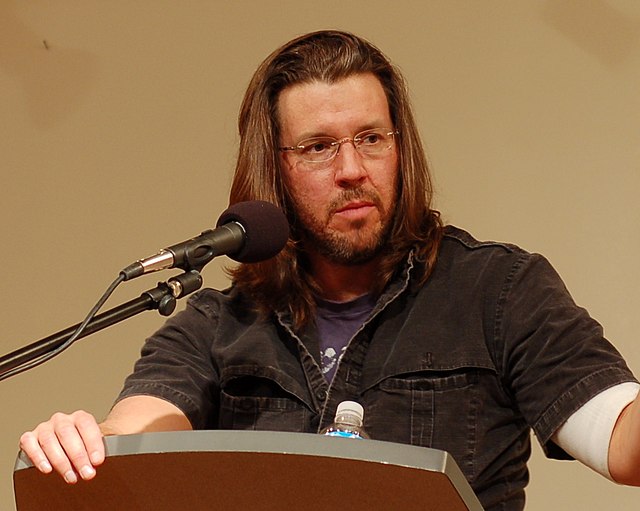By Eric Valentine
This Is Water by David Foster Wallace is the most compelling YouTube video I’ve ever seen. It’s a commencement address the author gave in 2005—the year most high school seniors were born. No spoiler alerts here. Just Google it—22 minutes of one of America’s greatest verbal minds bluntly mansplaining how the educational accomplishment they are celebrating is not about them, nor is it about how they can change the world, nor does it preach or advise them how to act hence forward. Rather, the pomp and circumstance signifies their ability to get through an ordinary, dull, and/or frustrating typical American day—with compassion and grace and joy, by choosing not just how to think or what to know, but what to think about in the first place.
Fast forward just a few years from that speech and we find our commencement speaker must have been thinking a lot about his depression disorder over that time, ultimately ending his privilege to ever speak again. Wallace committed suicide, by hanging himself, on Sept. 12, 2008. His suicide was a tragic cliche, or worse, a deliberate irony¹ taking place one day after the seventh anniversary of 9/11—the tragic event he wrote poignantly about in a book called The View From Mrs. Thompson’s.
What follows is not my attempt to mimic him; that would be an insult to him and a disservice to me. I do hope, though, it sounds like him, at least enough to remind folks of him, ideally. Equally, and more humbly, OK is for all this to sound not enough like him, so that readers miss him. Or, if they missed his existence entirely, are compelled to just Amazon it—12 books of stunningly insightful essays and uniquely genius novels Americans can only paradoxically understand await.
The Speech
DFW: Greetings and salutations, soon-to-be graduating seniors of 2023. Congratulations on getting this far—Sept. 1, 2022, your new back-to-school day and, if you haven’t peaked already, the commencement of what many will call the best part of the rest of your life. Here are four things I wish I had known before entering that part of my life.
Manage expectations. I don’t think I expected too much from the people in my life who disappointed me most. I expected nothing more from them I hadn’t given already. In fact, I expected, and got, less. So instead, make sure their expectations of you do not exceed what they are ready to give in return to you. This means you will not always help those ‘less fortunate’ than you. It’s OK. You’ll make up for it as you go. The alternative will keep you inside an un-fertile loop in which your soul cannot grow and, as Emerson said, you’ll condemn yourself to see “in all works of genius … your own rejected thoughts…”
Be a citizen of the world. There is no harsher tragic reality in life than an individual life being lost in servitude to the collective life of any nation or ethnicity or religion or group. From scapegoat to the GOAT, everyone should make this their mantra: civilization is worth living for not dying for. This truth will help you to explore and grow and set you free from burdens of hatred and intolerance—perhaps not the ones held toward you but at least the ones you would have held against mostly anyone else.
Establish frames of reference. True empathy is not claiming to feel someone else’s feeling; that’s sympathy, and even therein the feeling is only yours. Empathy is a choice, to understand how another’s feeling or view got formed, not a psychotic stimulus-response that gets you off the hook. Leave the feral and binary reflexes to the AI robots and trained monkeys who mindlessly do that. Instead, understand how far a distance a light year is and that the planet is 4 billion years old. Ponder things like how every alien and extraterrestrial craft we discover hence forward could actually be remnants of the past that ruled the Earth before. Think about meaningless things, like the food they ate and what the Earth was named back then. Then bbq something, with someone perhaps, and have a deep laugh. Small moments between real people are the only peace treaties planet Earth needs.
Know your ego. It’s not your level of arrogance. It’s a mask covering your soul that disguises as superego (morality) and id (passion). It hides out in manners and colloquialisms and trends and tasks of the day. But to develop true tastes requires a commitment to the ring of truth in one’s body. Hearing that ring requires you to stop seeing yourself through the vantage point of others. The first law of human consciousness is that doing so is impossible. That is true. But you can catch what’s going on almost instantly, and then just stop and hear this: You were never all the feelings and thoughts inside of you, but only and always, the things you actually do.
¹ An obvious irony is built into the whole commencement (a beginning) ceremony wherein a graduation (a completion) is being celebrated. Not pointing out this obviousness, ironically, is where Wallace’s genius begins and Valentine’s deliberateness should end.



